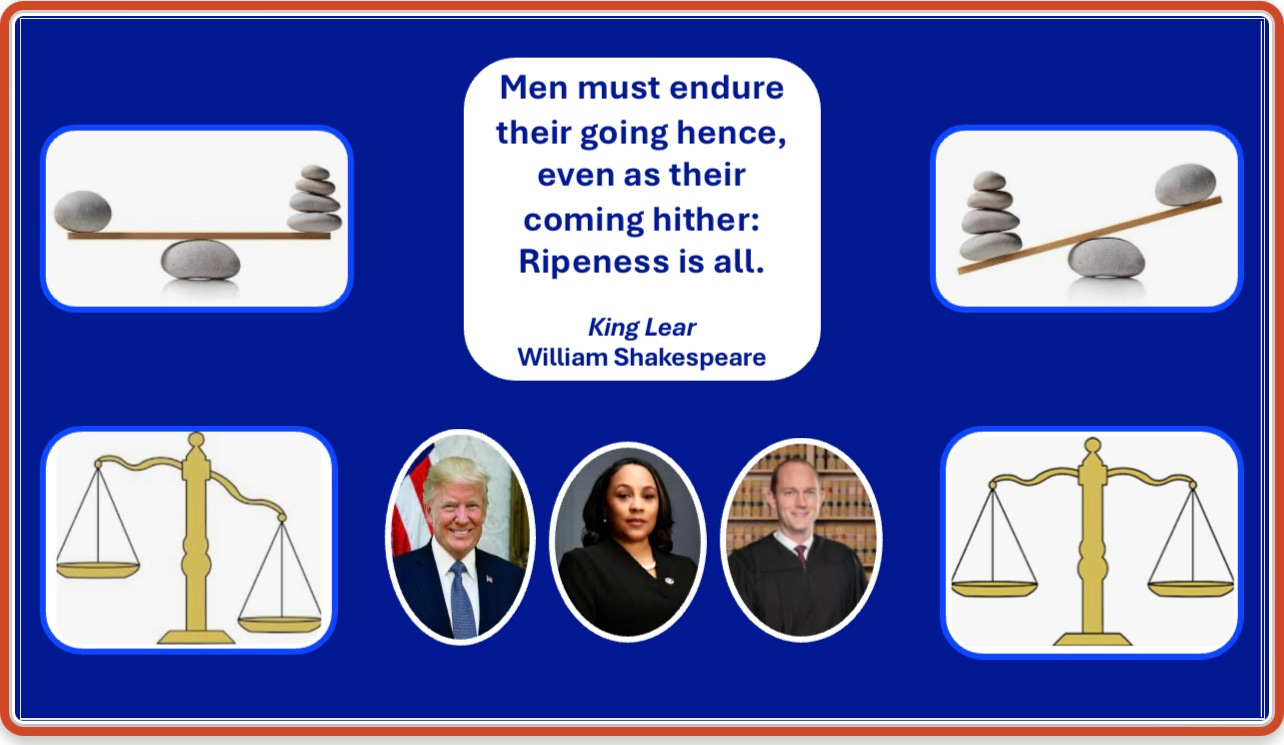Greetings, this first Sunday morning of spring!
Fellow Charlotte Observer alum and friend Katherine Neely Forney’s aptly timed, wry post somehow signaled both season of lush, new life and a current news-scape more alarmingly somnolent (or worse) by the day, week and month.
The Shakespeare quote of today’s ripeness title image had been coming to mind repeatedly over recent weeks in a similar quirky mix. There’s surging springlike hope, right alongside forebodings of democracy’s death-by-a-thousand cuts… (and the wondering which of them might prove to have been the coup de grâce/death-blow.)
News-wise: For excellent comprehensive Friday-night recaps of the week’s jaw-dropping developments on many fronts critical to our democracy, see the day’s posts from both the political-historian (https://heathercoxrichardson.substack.com) and the progressive attorney-activist (https://roberthubbell.substack.com.)
For me the bard’s quote from King Lear points to the need for us to become able to stand poised at the ready, for the inevitability of death in its own time — while also seizing life to savor its every flavor and morsel. The dynamic tension seems somehow essential, exquisite, excruciating all at once — kind of a both “the sky is falling!” and “life goes on!”
This edition’s news-topic focal point, through various newShrink lenses, is the Atlanta judge’s rulings on District Attorney Fani Willis in the criminal prosecution of Donald Trump and multiple codefendants. They face felony racketeering charges after a special Georgia grand jury indicted them last summer for illegal efforts to overturn the 2020 presidential election in the state.
At issue of late has been the question — to disqualify DA Wills as prosecutor… or not? — raised by Trump-defense attorneys before the Georgia Superior Court of presiding Judge Scott McAfee.
As described in newShrink 2.28.24 “Reverie, Reflection,” today’s reflections and summary comments conclude several somewhat immersive weeks exploring pros, cons and closer looks at this decision’s key figures, particularly Willis and McAfee. Sources most illuminating and conclusive (in some surprising ways) have been:
Televised live taped gavel-to-gavel coverage of the two-day evidentiary hearing in February and two later follow-up days. (Available for continued later viewing on You Tube, also some broadcast news websites);
Full-text transcript of McAfee’s ruling last week allowing Willis to continue as prosecutor, but contingent on Nathan Wade’s resignation (which he provided). The judge also issued multiple stern rebukes, warnings, suggested further avenues for ethical reviews, and granted defense rights to appeal the decision while trial proceedings continue. (linked below); and
Bios, published profiles and general-interest interviews with McAfee and Willis outside court and their respective roles there (samples linked below).
🔵
first, news
For those who can use a refresher on specifics, this Washington Post story has some background review plus a video clip of key testimony in the February hearing:
Unlike in all federal courtrooms, and in many states by judges’ discretion, these Georgia criminal cases against Trump and codefendants are televised live and taped for later viewing via You Tube. Last September the twice conservative-appointed Judge McAfee took the surprising step — discouraged by conservative jurists and under surely escalating MAGA fire — to exercise his discretion allowing televised proceedings in the Trump cases. To me this principled stated call for maximum transparency is to his credit.
Where possible in courtrooms, and particularly in this one, I again urge watching at least key segments of full televised proceedings live or afterward via You Tube. The main defendant has become the presumptive Republican Party candidate in this year’s campaign for president of the United States. Red- and blue-leaning Americans alike would do well to watch and follow, if only as closeup example of how functioning courts messily work (and are supposed to work) in a democracy.
the rulings
Primary sources are linked here, starting with:
Judge Rules D.A. Can Stay on Trump Georgia Case With Ex-Boyfriend Stepping Down (New York Times)
Full transcript of the Judge McAfee ruling:
ORDER ON DEFENDANTS’ MOTIONS TO DISMISS AND DISQUALIFY THE FULTON COUNTY DISTRICT ATTORNEY
Meanwhile, Trump-case defense team efforts to challenge Willis as prosecutor continue through other ethics, legislative and appeals channels. The ultimate timing or even proceeding of case prosecution remains unknown.
Fulton County ethics board drops Fani Willis complaints from hearing (The Hill, March 7)
Defense Attorney Ashleigh Merchant testifies before Georgia senate committee investigating Fani Willis (Fox TV Atlanta, March 6)
Georgia judge allows Trump defendants to file immediate appeal in Fani Willis disqualification ruling — but he will not pause or delay case proceedings while it is happening. (The Hill, March 20)
🔵
key figures & their bios
Especially in such a politically polarized era across our society, an important thing to note about the courts, legal system and careers within it is that they don’t — and couldn’t very effectively — work that way. Advocates are adversaries, not enemies, whose roles can reverse from case to case or for different stretches of a legal career. Many great lawyers, as well as those on judicial bench, have served as advocates on both sides.
In this case several examples illustrate.
Judicial races in Georgia are nonpartisan, and McAfee is not formally aligned with a political party as he campaigns this spring for a full term on the Fulton County bench he has occupied just a year.
Judge Scott McAfee was appointed to the bench just a year ago February, by Republican Georgia Governor Brian Kemp. Kemp had also appointed him to his previous position of State Inspector General.
Interestingly, Brian Kemp is a star prosecution witness against Donald Trump defendants in the attempted election-overthrow. The Republican governor, along with Republican Secretary of State Brad Raffensperger, resisted Trump and associates’ pressure to overturn the fair 2020 election of Joe Biden in the state.
Before his appointment as Inspector General, McAfee was a senior assistant district attorney prosecuting major crimes under then-head of the unit: Fani Willis, his boss with whom he reportedly had a great relationship. (Campaign finance records indicate McAfee’s wife donated $99 to Willis’ unsuccessful campaign for Superior Court Judge while he was still at the DA’s office and she by then in private practice. McAfee and his wife then donated $100 each to her successful campaign for district attorney in 2020.)
Not long after law school and an assistant DA stint in a rural Georgia country McAfee had become an ADA in the Fulton County DA’s office.
Most-noted standout points about Judge Scott McAfee tend to be his youth and rapid rise just a decade out of law school; undergrad scholarship as an accomplished cellist double-majoring in music and political science; and consistent though apparently not zealous conservative/Republican bona fides and appointments dating back to law school. Born in 1988 or 1989 in Kennesaw, Georgia north of Atlanta, McAfee was an Eagle Scout who attended Emory on a music scholarship to play in the symphony there.
He and his wife have two children. And a lively wit along with unexpected talents from a poker-faced judge come through in a couple of these pieces.
What a Man: In Georgia Judge, Has Trump Finally Met His Audience-Thrilling Match? (The New Yorker, September 18, 2023)
Trump’s Georgia case hangs on key decisions of a relatively new judge (The Washington Post, March 3, 2024)
Fani Taifa (Floyd ) Willis, 52, was elected Fulton County district attorney. Georgia’s largest county with 1.065 million people, Fulton has a 43% Black majority population.
Willis’ campaign and election was in 2020, during COVID lockdowns. (According to sworn court testimony by her lawyer father, that is when he moved into her home with her after living abroad — and she was in an at-least-partly live-in relationship with government employee who did part-time popular gigs as an event DJ named “Deuce.”)
Willis’ 2020 election was also amid national outrage, protest backlash regarding police and prosecution of Blacks were high. That May a white Minneapolis police officer had killed, and was later convicting of murdering, an unarmed Black man named George Floyd, Willis has served as Fulton County first female and Black district attorney since January 2021 — a charged time of pressure from all sides for a Black DA, anywhere.
Willis — whose birth names Fani Taifa are Swahili for “prosperous people” — was born in 1971 in Inglewood, CA. Her Harvard-educated international civl rights-lawyer father, John C. Floyd III, had founded a faction of the Black Panthers but soon left after becoming disillusioned with the movement’s infighting. When Fani was in first grade, her family moved to Washington, DC, where her father practiced as a criminal defense lawyer. When her parents divorced and her mother moved back to California, Fani lived mostly in Washington with her dad.
After graduating from an all-girls Catholic high school she studied political science and graduated cum laude from Howard University, then moved to Atlanta to study law at Emory University, where she graduated in 1996. Almost immediately after law school and passing the bar she married videographer Fred Willis, with whom she had her two daughters. Her girls are now mostly grown, and she and Fred Willis have been divorced since 2005.
After early private practice she worked as a prosecuting city solicitor before working 16 years as a prosecutor in the Fulton County DA’s office. Her most prominent case was as an assistant DA leading prosecution in the 2014-2015 Atlanta Public Schools cheating scandal trial. Twelve educators were accused of changing test answers to inflate standardized test scores. Eleven of the 12 were convicted of racketeering under Georgia’s RICO statute.
Willis went into private practice in 2018, the same year she ran for a seat on the Fulton County Superior Court, and lost. In 2019 she became Chief Municipal Judge for South Fulton, GA, then ran her successful campaign for DA in the 2020 November election,.
Regarding Willis’ personal life, both court testimony and Judge McAfee’s written decision refuted credibility of both witnesses the Trump-defense had claimed “knew” that she began dating lawyer Nathan Wade when they met in 2019. (Each had substantial job and financial motives for retaliation against Wade or Willis, and prior claims to defense lawyers by each had collapsed or largely disappeared by the time they were in court. The judge’s written order articulates this in clear detail with his ruling that the defense had not met its burden of proving and testifying truthfully about actual conflict of interest.
However, the judge’s order explicitly denies to Willis’s own testifying witnesses the same level of attention and consideration he has just granted in writing — to defense witnesses found to be not credible! Instead, with a sweeping shift of tone he writes that neither side was able to show by a preponderance of the evidence when the relationship with Nathan Wade “evolved into a romantic one.” Going further — while completely disregarding or even mentioning Willis witness testimony that sounded quite convincing. The judge applies here a general, damning reference “an odor of mendacity that remains” — a reference to which Willis nor anyone else has possible recourse for reply.
Finally in this section — of an otherwise fair, nuanced and well-supported order — McAfee writes that he “can’t and is not under obligation to ferret-out every instance of potential dishonesty from each witness or defendant as presented in open court.”
Simply acknowledging factual testimony presented under oath, in your own courtroom, doesn’t seem such an onerous ferreting out task when you’re vaguely labeling someone a stinking liar.
My objection to this section, reading entirely as a layperson of course, is these statements are made in lingering disparagement of Willis who is an elected public servant, with utter disregard for several hours of very specific sworn testimony by two attorneys who are officers of the court, with verifiable times, names, dates plus common-sense contexts that support Willis’ sworn testimony that she didn’t begin dating Wade until after he was hired in November 2021. It seems to me the order needed to either say more here, or less.
Atlanta’s First Black Female District Attorney Is at the Center of America’s Converging Crises (Time magazine profile, September 28, 2021)
This last one is more clumsily written, but captures Willis more multi-dimensionally.
You can call her “Madam DA”: ‘Fani Willis on making history (January 4, 2021 South Atlanta Magazine profile posted on fultoncoutryga.gov/news website.)
Below is a look at the Atlanta law firm of husband-and-wife defense attorneys John and Ashleigh Merchant. Ashleigh brought the disqualification case against Willis on behalf of her client, Trump codefendant Mike Roman. In basic facts and significant details both Merchants’ education, legal credentials, honors and recognition on both sides of courtroom and community are compelling. Ashleigh Merchant is current president of the Georgia Association of Criminal Defense Lawyers.
The Merchant Law Firm: We’ve Fought for the Accused More than 18 Years
Among interesting optics when following the live televised case, Roman’s lead-lawyer — presenting mostly throughout — was tall, long blond-haired 46-year-old Ashleigh Merchant. Over two days of the main evidentiary hearing her consistent demeanor was a breathlessly curl-twirling, calibrated scattered-ness that stopped just short of ditzy-airhead. Merchant, along with the visual-cadre of white male defense lawyers on her side of the room, judge and most court staff were stark contrasts.
Just across aisle and bench were: the testifying, fiercely focused Black female target of multiple salacious accusations; other than the compelling and popular white liberal Democrat former Georgia Governor Roy Barnes, nearly all Black witnesses, speaking credibly and specifically on Willis’ behalf; and multiple rows of Black supporters from the Atlanta legal and political community, including the recent former mayor.
Then on the week-later final day of closing arguments before Judge McAfee the scene — and both Ashleighs — were entirely different. Demure, mostly quiet and seated save for fetching papers and water, was lead-attorney Ashleigh. Crisp, razor-sharp with whip-smart points was husband John — from central casting lacking only the cape of some superhero-daddy to the rescue, arrived to close the deal.
Reading their bios and content of their case arguments I am fairly sure this nauseating dynamic was intentional for purposes of visual and style alignment with the judge in this case, not pattern or norm for this pair of educated high-achievers long married and the parents of two daughters.
🔵
From all this a good bit of my overall take on this strange phase of the Georgia Trump court-cases can be summed-up in a colorful adage-snippet of some earlier era. Overheard by chance in news commentary from another room:
“If you’re going to shoot at the Devil…”
Given the sheer, all-around-perverse cringe-worthiness here, little wonder that current, most commonly heard cliche-descriptors for the barely 35-year-old Judge McAfee are such terms as “King Solomon-like” and “ideal judicial temperament.” I’ve found McAfee’s courtroom demeanor and management impressive, the overall thrust of the qualified ruling not to disqualify Willis sound and fair, his resume and bio astonishingly strong (and downright fun in places!)
There are also instances, both in courtroom and in written ruling, where Judge McAfee demonstrates glaring blind-spots or possibly intentional dodges regarding race and gender. It seems perhaps attempted judicial “neutrality” defined by operating as though gender and race were nonexistent factors and not in the room.
At every level here — disqualification efforts, content of the pending criminal case itself and its players, as well as the judge’s entire jurisdiction — where contexts of both gender and race could hardly be more salient factors, that is simply, breathtakingly inappropriate. (And happens all the time.) Becoming aware of that as an intentional consideration in court and in rulings would help McAfee become a better judge.
And regarding Willis’ part, even from many who most support and admire her professionally, personally or both, the overwhelming take is in the judge’s words“enormous lapse in judgment,” And from others “unforced error” — one of staggering magnitude, from a by-many-measures seasoned, maybe brilliant 52-year-old career-long warrior of a professional, mother, friend, daughter, person of faith, community advocate. Who absolutely “knew better.” .As do most all of us, when not in throes and fiercest grip of one or another of the universal, utterly unconscious psychological energies that Jung described and explored as archetypes.
For the record (and for what it’s worth), I’m fairly convinced the operative archetypes for a time possessing Willis regarding Nathan Wade were warrior-hubris at surge and scent of victory (plus proximity during emergence from COVID-years confinement). This was no irresistible Eros “romance” or Aphrodite love-match. (Nor was it believably a female drive for self-enrichment/empowerment through a man — via someone, albeit male, with considerably less relative situational power and available wealth than her own.)
In any event, the closing phrase of that above admonition is
“… you had better not miss.”
Regarding Trumpism, Trump accountability and maybe for the sake of democracy itself, one can only hope that DA Fani Willis hasn’t, and won’t.
🔵
Between tax-season, holiday-birthday time for grand Miz E and some AVL-exploring, the next few weeks’ editions will likely be short takes and postcards. There’ll be more later about those proverbial l”obsters (or frogs) boiling in a pot”… as soon as I’m able to bear thinking about it!
I’ll leave you now with a few more upbeat or humorous…
odds & ends
And, that is all I have! Talk to you next week.
🦋💙 tish
… it is important that awake people be awake,
or a breaking line may discourage them back to sleep;
the signals we give — yes or no, or maybe —
should be clear: the darkness around us is deep.
— William Stafford, “A Ritual to Read to Each Other”
🔵






